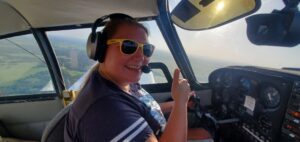 The demand for new pilots in the private aviation business world has really changed. Once, the skies were vast and empty, with only a few pioneers daring to take flight. But with time, technology advanced, and the dream of soaring through the clouds became a reality for many. In the United States, private aviation had experienced a meteoric rise, and with it came an unprecedented need for new pilots to navigate the ever-expanding skies. The private aviation business world was flourishing, driven by the desires of high-profile executives, celebrities, and discerning travelers who sought unparalleled convenience, luxury, and efficiency. The advantages of flying private were evident, as it offered personalized flight schedules, direct routes to remote destinations, and the avoidance of the often chaotic commercial airport experience. However, the industry found itself at a critical juncture recently. A shortage of experienced pilots began to loom on the horizon, casting a shadow over the thriving enterprise. The soaring demand for private aviation services outpaced the number of skilled pilots available, leaving business jet operators grappling with the challenge of satisfying their clients’ needs.
The demand for new pilots in the private aviation business world has really changed. Once, the skies were vast and empty, with only a few pioneers daring to take flight. But with time, technology advanced, and the dream of soaring through the clouds became a reality for many. In the United States, private aviation had experienced a meteoric rise, and with it came an unprecedented need for new pilots to navigate the ever-expanding skies. The private aviation business world was flourishing, driven by the desires of high-profile executives, celebrities, and discerning travelers who sought unparalleled convenience, luxury, and efficiency. The advantages of flying private were evident, as it offered personalized flight schedules, direct routes to remote destinations, and the avoidance of the often chaotic commercial airport experience. However, the industry found itself at a critical juncture recently. A shortage of experienced pilots began to loom on the horizon, casting a shadow over the thriving enterprise. The soaring demand for private aviation services outpaced the number of skilled pilots available, leaving business jet operators grappling with the challenge of satisfying their clients’ needs.
Aviation Business Pilot Shortages
The reasons for the aviation business pilot shortages are manifold. An aging workforce of seasoned aviators retired, and fewer young enthusiasts were choosing aviation as a career path. Then the Covid-19 Pandemic shook up the entire industry from private to commercial causing layoffs and more forced early retirements. The high costs associated with obtaining a pilot’s license and the extensive training required deter potential candidates. Moreover, the allure of glamorous tech careers and other lucrative industries entice many away from the skies. As the issue intensified, key players in the private aviation business world recognized the urgent need for action. Industry leaders collaborated to devise comprehensive strategies aimed at cultivating a new generation of pilots and revitalizing interest in aviation as a profession:
- Aviation companies and flight schools established scholarship programs to alleviate the financial burden for aspiring pilots. These scholarships target talented individuals who display a passion for flying but lack the means to pursue their dreams. By investing in these promising candidates, some from other nations and countries, the private aviation industry hopes to inspire a new wave of aviators.
- Companies launched widespread outreach programs in high schools and universities, aiming to introduce aviation as a viable career option to young minds.
- Aviation expos, workshops, and guest lectures by accomplished pilots become commonplace in educational institutions. These initiatives seek to showcase the thrilling aspects of flying and highlight the potential for lucrative and fulfilling careers in private aviation.
- The industry also acknowledges the importance of fostering a culture that encourages diversity and inclusivity. Emphasizing that aviation was not a field reserved for a select few, but rather a domain open to all individuals with a passion for flight, they aim to break down barriers and preconceived notions associated with aviation careers.
Women Pilots in the Private Aviation Business
In recent years, women have increasingly embraced the profession of airline pilots due to a combination of factors. Advancements in gender equality and changing societal norms have encouraged more women to break into traditionally male-dominated fields, including aviation. As a result, airlines and aviation organizations have actively promote diversity and inclusivity, creating a welcoming environment for female pilots. Additionally, the growing awareness of the rewarding and fulfilling nature of a career in aviation, along with the availability of scholarships and mentorship programs, has encouraged women to pursue their passion for flying. This shift in perspective is gradually breaking down the barriers that once hindered women from entering the cockpit, empowering them to reach new heights in the aviation industry.
Advanced Flight Simulators and Training Technology
One of the most significant strides has been the implementation of advanced flight simulators and training technologies. These sophisticated tools not only reduce training costs but also offer aspiring pilots a realistic and immersive experience, preparing them for the challenges of piloting aircraft in various conditions. As these collective efforts begin to bear fruit, a new generation of skilled and enthusiastic pilots are emerging. The private aviation business world has recently experienced a breath of fresh air as it welcomes these individuals, eager to take on the skies and embrace the responsibilities of piloting high-profile clientele. The demand for private aviation services continues to rise, but the industry is now equipped to meet it head-on. With well-trained and diverse pilots at the helm, private aviation companies can not only maintain their high standards of service but also set new benchmarks for excellence.
The Future of the Private Aviation Industry
As the private aviation industry unites in its commitment to nurturing the next generation of aviators, it ensures that the skies remain boundless and accessible to those with the spirit to soar above and beyond. With well-trained and diverse pilots at the helm, the demand for private aviation services can be met or even surpassed, setting new benchmarks for excellence. This soaring success will not only secure the future of the industry but also reinforce the belief that dreams were meant to take flight, and the skies are a canvas of endless possibilities for those daring enough to embrace the adventure of aviation.

